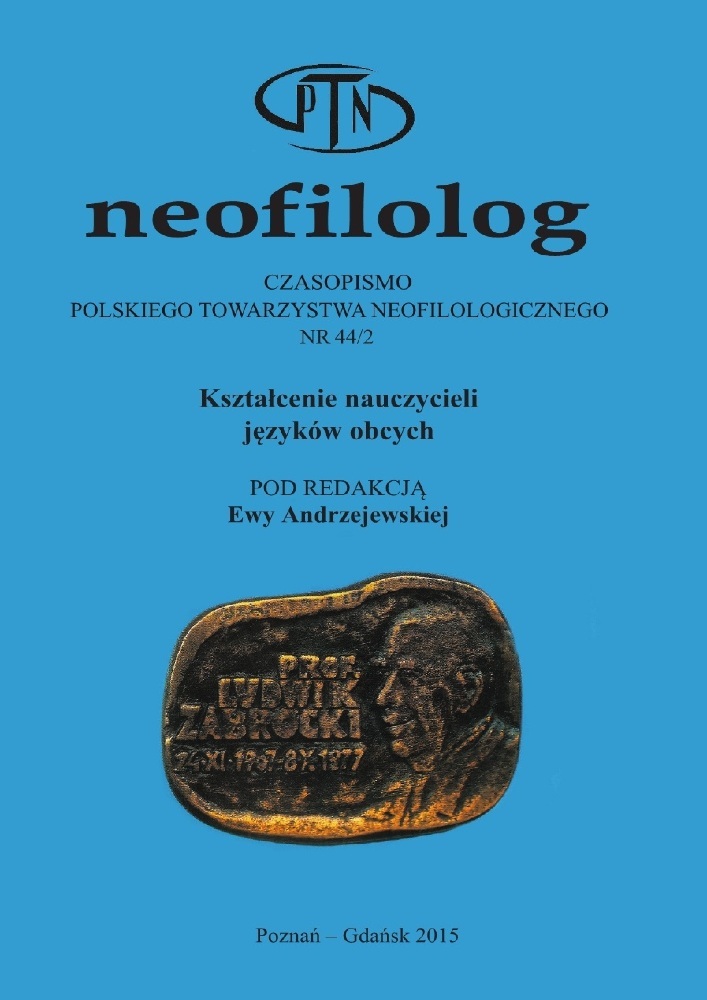Abstrakt
This paper takes data from the first part of a longitudinal study, “Learning and Teaching Foreign Languages in lower secondary school”, conducted by the Educational Research Institute in Warsaw. The sample is large scale and representative at the level of school, which allows us to generalise to the general population with some degree of confidence. From the data several areas appear to give cause for concern. The first is organisation of work in class, where pair and group work were found to be rare. The focus of lessons would currently appear to more often emphasize grammar, vocabulary or receptive skills than productive skills. What is tested does not always seem to reflect what is taught, which suggests that assessment practices may not be fully informed. Motivating learners and engaging them in the lesson is also reported as a cause of dissatisfaction. Teachers were found to hold mixed views regarding the importance of independent learning, which suggests more emphasis needs to be placed on the understanding of learner autonomy. This paper discusses each of these areas in turn, with illustrations from the data, and makes suggestions for how teacher education could be enhanced.Bibliografia
Ellis, M. 2014a. “Studying the spoken competence of 15 year olds” (w) Language Skills: Traditions, transitions and ways forward (red. H. Chodkiewicz, M. Trepczyńska). Newcastle-upon-Tyne: Cambridge Scholars: 62-80.
Ellis, M. 2014b. “English lessons in lower secondary schools in Poland: Reflections based on learner voices”. Neofilolog 42(1): 25-38.
Instytut Badań Edukacyjnych. 2013. Europejskie Badanie Kompetencji Językowych – ESLC. Raport Krajowy. Warszawa: IBE.
Instytut Badań Edukacyjnych. 2014. Język angielski w gimnazjum: Raport cząstkowy z pierwszego etapu badania uczenia się i nauczania języków obcych w gimnazjum. Warszawa: IBE.
Kelly, M., Grenfell, M. 2004. European Profile for Language Teacher Education. A Frame of Reference. Southampton: University of Southampton.
MEN. 2009. Podstawa Programowa z komentarzami. Tom 3. Języki obce w szkole podstawowej, gimnazjum i liceum. Warszawa: Ministerstwo Edukacji Narodowej.
MNiSW. 2011. Rozporządzenie Ministra Nauki i Szkolnictwa Wyższego z dnia 2 listopada 2011 r. W sprawie krajowych ram kwalifikacji dla szkolnictwa wyższego. Warszawa: Ministerstwo Nauki i Szkolnictwa Wyższego.
Piechurska-Kuciel, E. 2011.Willingness to communicate in L2 and self-perceived levels of FL skills in Polish adolescents (w) Aspects of culture in second language acquisition and foreign language learning (red. J. Arabski, A. Wojtaszek). Berlin: Springer: 235-250.
Woodward, T. 1988. Loop Input. Canterbury: Pilgrims.
Licencja
Prawa autorskie (c) 2019 Melanie Ellis

Utwór dostępny jest na licencji Creative Commons Uznanie autorstwa – Bez utworów zależnych 4.0 Międzynarodowe.
Przedstawiany utwór (artykuł) upubliczniany jest na podstawie umowy z autorem i na licencji Creative Commons Attribution-NoDerivatives 4.0 International (CC BY-ND 4.0).
Użytkownicy mają obowiązek podania wraz z rozpowszechnionym utworem, informacji o autorstwie, tytule, źródle (odnośniki do oryginalnego utworu, DOI) oraz samej licencji;
- bez tworzenia utworów zależnych,
- utwór musi być zachowany w oryginalnej postaci.
Uniwersytet im. Adama Mickiewicza w Poznaniu zachowuje prawo do czasopisma jako całości (układ, forma graficzna, tytuł, projekt okładki, logo itp.).
